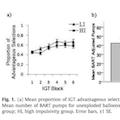Abstract
The Iowa Gambling Task (IGT) is sensitive to decision-making impairments in several clinical groups with frontal impairment. However the complexity of the IGT, particularly in terms of its learning requirements, makes it difficult to know whether disadvantageous (risky) selections in this task reflect deliberate risk taking or a failure to recognise risk. To determine whether propensity for risk taking contributes to IGT performance, we correlated IGT selections with a measure of propensity for risk taking from the Balloon Analogue Risk Task (BART), taking into account potential moderating effects of IGT learning requirements, and trait impulsivity, which is associated with learning difficulties. We found that IGT and BART performance were related, but only in the later stages of the IGT, and only in participants with low trait impulsivity. This finding suggests that IGT performance may reflect different underlying processes in individuals with low and high trait impulsivity. In individuals with low trait impulsivity, it appears that risky selections in the IGT reflect in part, propensity for risk seeking, but only after the development of explicit knowledge of IGT risks after a period of learning.
